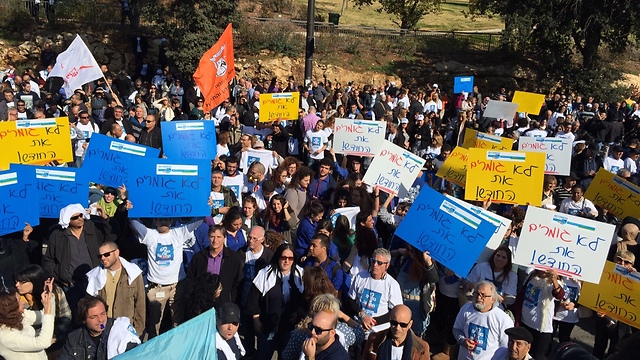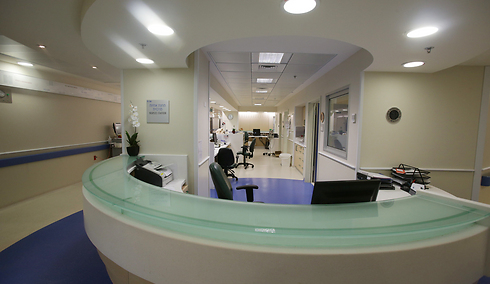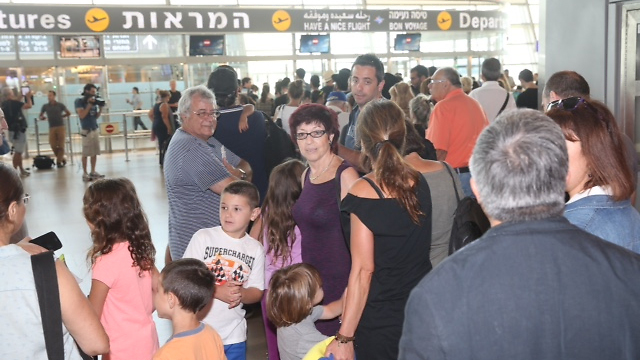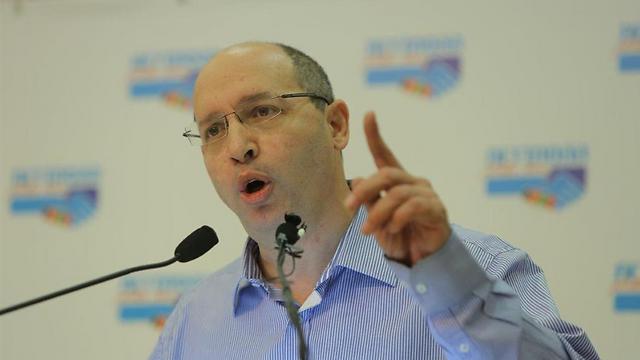Histadrut workers’ union demands 11% raise in wages in the public sector; direct economic damages of a strike are estimated at about NIS 300 million a day.
Negotiations between the Histadrut workers’ union and th Finance Ministry continued into the night in an effort to prevent a nationwide strike on Wednesday in a battle over public sector wages.
If the strike goes ahead, it is expected to include government offices, airports and seaports, public transportation, hospitals and schools.

The Histadrut – the umbrella organization for public sector workers – is demanding an 11 percent pay raise for civil workers spread over the next five years, saying many Israelis have trouble making ends meet. That would cost the state about NIS 11 billion and likely require budget cuts elsewhere.
Finance Minister Moshe Kahlon, however, only agrees for a raise between three percent over five years (about 0.6 percent a year, in line with the expected annual level of inflation) to seven percent over five years (1.5 percent a year).
Negotiations have gone nowhere to date due to a government insistence that lower salaried workers receive more while those earning higher wages get less of a raise.
Business leaders estimate direct economic damage at about NIS 300 million ($77 million) a day while the government sees total damage at NIS 1 billion to NIS 3 billion daily.
Who’s on strike?
The public sector in Israel includes 1.26 million workers, who will all stay at home if a compromise can’t be reached between the Finance Ministry and the Histadrut.
Included in the strike are government ministries, Knesset employees, Civil Service Commission employees, the Israel Broadcast Authority, the National Road Safety Authority, the Standards Institution of Israel, the Israel Post Office; and the Bank of Israel. At the Electricity Corporation, disruptions are expected in the service and customer service call centers.
Health services will also take a hit as government hospitals, as well as Jerusalem’s Shaare Zedek Medical Center and Hadassah Medical Center in Ein Karem, will operate in limited capacity. The strike will include the nurses, administration workers, and paramedical teams, but will not include the doctors.
“Those who are involved in life-saving treatment will not be on strike and will provide assistance. If a question arises regarding the urgency of a treatment, a special committee will discuss each case’s details,” a Histadrut official said.

NHOs Clalit and Meuhedet will also not offer services, while Magen David Adom paramedics and medics will work in a limited capacity.
The Teachers’ Association and the Teachers Union will join the strike, meaning schools and high schools across the country, as well as the Kibbutzim College, will stay closed.
The Council for Higher Education of Israel is also expected to join the strike. The administrative staff in universities will be on strike but the academic staff will not. Classes and exams will be held as normal at Tel Aviv University, Bar Ilan University, the Hebrew University, Ben Gurion University and the Technion.
The municipalities of Tel Aviv, Jerusalem and Haifa will not offer municipal services like trash disposal and other sanitation services, reception of the public, and planning and construction committees. According to the Histadrut, the Fire and Rescue Commission will also be a part of the strike.
The courts will operate in limited capacity to allow for hearings on urgent matters. Typists and secretaries will be on strike, leading to possible disruptions to court hearings. There will also be no reception of the public.
The Israel Airports Authority is also expected to go on strike, meaning the closure of country’s airspae between 6am and 6pm on Wednesday.
At Ben Gurion International Airport, emergency flights, firefighting flights, and medical air transport flights will continue operating as normal, but all commercial flights will be grounded.

Israeli airline Arkia cancelled some of its flights, including a 9:30am flight to Eilat and the 10:30am return flight, while flag carrier El Al moved up 20 flights to New York and Europe scheduled for Wednesday morning by as much as four hours. French airline Air France and Dutch airline KLM also moved up some of their flights.
Israel’s seaports – Ashdod, Haifa, Eilat and Hadera – will not operate, neither will trains and Egged buses. At present, the Dan bus company is not among those on strike.
Some culture centers will be included in the strike, including the Israel Museum in Jerusalem and the Israel Museum in Tel Aviv, the Tel Aviv Museum of Art, and Beit Hatfutsot Museum. The Israel Antiquities Authority, the Nature and Parks Authority and the KKL-JNF (Keren Kayemeth LeIsrael–Jewish National Fund) will also be part of the strike.
Finally, citizens who work for the IDF will not work and the Tel Aviv Stock Exchange will remain closed.

In an attempt to prevent the strike, the Finance and Education Ministries, the Federation of Local Authorities and the three major cities (Tel Aviv, Jerusalem, and Haifa) petitioned the Jerusalem Labor Court to issue an injunction against the Teachers’ Association’s planned strike.
The petitioners claim that as part of the latest reform in the education system, the Teachers’ Association has agreed to maintain “industrial peace” until August 31, 2017, and therefore cannot go on strike.
“We expect the Histadrut to take advantage of the negotiations to the fullest extent and truly take care of the weaker workers, rather than cause damages to the Israeli economy in the form of a wild and unnecessary strike,” said Finance Ministry director-general Shai Babad.
The Manufacturers’ Association and Federation of Chambers of Commerce have also asked the labor court to prevent any strike.
The court hearings are expected to start at 9pm and continue into the night.
The last strike, which lasted three days in early 2012, cost the economy some NIS 6 billion and ended with a new wage package for low-earning contract workers. A strike was averted last December when the Histadrut signed a deal with private sector employers to raise the minimum wage.
As reported by Ynetnews
